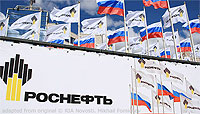Oil Giants' Deal Gets Mixed Reviews
Howard Amos
- Moscow Times - themoscowtimes.com - 4.20.12 - JRL 2012-73
Analysts heralded the significance of the tie-up between U.S. oil giant ExxonMobil and Kremlin-controlled Rosneft as a revolution for foreign investment in Russia on Thursday, while others warned that the long time frame required for Arctic energy projects meant it was too early for a final appraisal.
 Deputy Prime Minister Igor Sechin and the heads of ExxonMobil and Rosneft presented the details of the landmark project that could see total investment reach $500 billion to investors in New York on Wednesday.
Deputy Prime Minister Igor Sechin and the heads of ExxonMobil and Rosneft presented the details of the landmark project that could see total investment reach $500 billion to investors in New York on Wednesday.
"The deal is a breakthrough for the Russian oil industry and indicates a radically new approach to foreign investment in Russia," said the investment bank Merrill Lynch in a note to investors Thursday.
"We believe that the new regime will provide the certainty needed to attract foreign investment into Russian offshore."
Sechin told his audience that the deal was not just important for the companies involved, but a watershed moment for U.S.-Russian relations. He said it was more ambitious than sending a man to the moon, Reuters reported.
The value of the agreement, which includes profit-based taxation, lies in the template it has created for foreign investors looking to work in the Russian Arctic, Merrill Lynch said, and predicted that more such deals were likely to follow.
The key beneficiary of the new blueprint will be Rosneft, through which the majority of the joint ventures are likely to be realized. Merrill Lynch estimated Rosneft's share price could grow between 19 percent and 102 percent.
But, while they said the tax concessions offered by the Kremlin in the deal were "extraordinary," analysts from Troika Dialog downplayed any immediate benefits for Rosneft.
Even in a best-case scenario, a final investment decision would not be made before 2016 and oil will not be produced until after Russia's next presidential election.
"The market will concentrate on more medium-term drivers for the company and its stock," Troika said. "The relevance for Rosneft's fundamentals in the next five to 10 years is rather small."
Keywords: Russia, Oil, Energy - Russian News - Russia
Analysts heralded the significance of the tie-up between U.S. oil giant ExxonMobil and Kremlin-controlled Rosneft as a revolution for foreign investment in Russia on Thursday, while others warned that the long time frame required for Arctic energy projects meant it was too early for a final appraisal.
 Deputy Prime Minister Igor Sechin and the heads of ExxonMobil and Rosneft presented the details of the landmark project that could see total investment reach $500 billion to investors in New York on Wednesday.
Deputy Prime Minister Igor Sechin and the heads of ExxonMobil and Rosneft presented the details of the landmark project that could see total investment reach $500 billion to investors in New York on Wednesday.
"The deal is a breakthrough for the Russian oil industry and indicates a radically new approach to foreign investment in Russia," said the investment bank Merrill Lynch in a note to investors Thursday.
"We believe that the new regime will provide the certainty needed to attract foreign investment into Russian offshore."
Sechin told his audience that the deal was not just important for the companies involved, but a watershed moment for U.S.-Russian relations. He said it was more ambitious than sending a man to the moon, Reuters reported.
The value of the agreement, which includes profit-based taxation, lies in the template it has created for foreign investors looking to work in the Russian Arctic, Merrill Lynch said, and predicted that more such deals were likely to follow.
The key beneficiary of the new blueprint will be Rosneft, through which the majority of the joint ventures are likely to be realized. Merrill Lynch estimated Rosneft's share price could grow between 19 percent and 102 percent.
But, while they said the tax concessions offered by the Kremlin in the deal were "extraordinary," analysts from Troika Dialog downplayed any immediate benefits for Rosneft.
Even in a best-case scenario, a final investment decision would not be made before 2016 and oil will not be produced until after Russia's next presidential election.
"The market will concentrate on more medium-term drivers for the company and its stock," Troika said. "The relevance for Rosneft's fundamentals in the next five to 10 years is rather small."